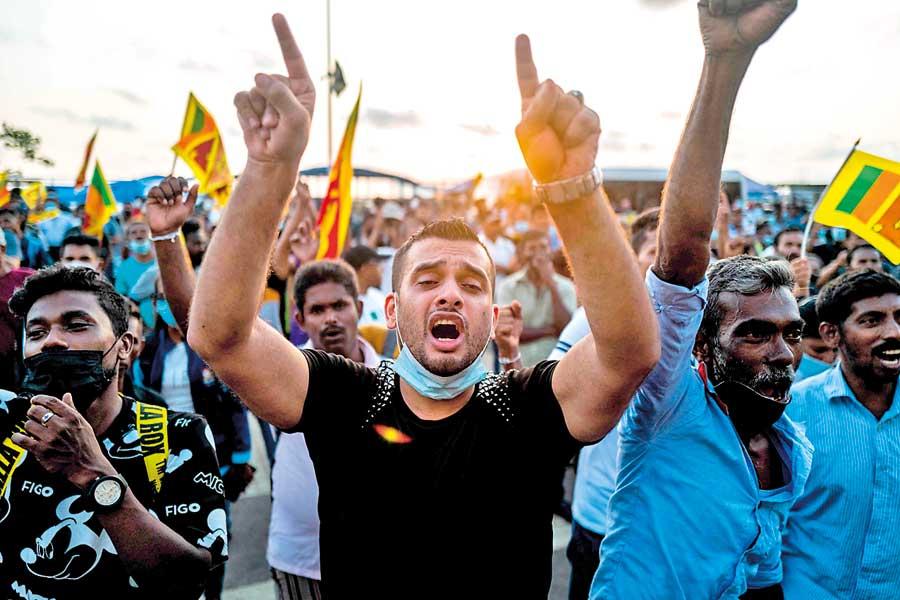22 Apr 2022 - {{hitsCtrl.values.hits}}

Protesters shout slogans during an ongoing anti-government demonstration near the president’s office in Colombo, demanding President Gotabaya Rajapaksa’s resignation over the country’s crippling economic crisis. AFP
Although #GoHomeGota and #GoHomeRajapaksas are trending Twitter hashtags today, the mood in the country was totally opposite around this time of the year in 2009 ,with days to go for the Sri Lankan military’s final and decisive war victory against the separatist rebels in the north.
for the Sri Lankan military’s final and decisive war victory against the separatist rebels in the north.
In the south of the country, the people hailed the then President Mahinda Rajapaksa and the then Defence Secretary Gotabaya Rajapaksa as saviours of the nation and held them in awe.
A few days before the war victory, a state television film crew was seen shooting a dancing event at the memorial at Independence Square. Young men and women performed the traditional dance to a song, the lyrics of which had the refrain “Ayubowewa Maharajanani” which means long live the great king, a reference to the war winning president Mahinda Rajapaksa. The song which also deified the President was played at victory celebrations and on state tv and radio channels for months.
While the President seemed to have been taking pleasure in the encomium, not realizing that the song was only bloating his ego to the detriment of his psychological well being, there was hardly a protest from civil society against the lyrics that had no place in a democracy. In the south, a majority of the people had then decided not to see the Rajapaksa wrongs and had been in denial about corruption and other allegations of criminal nature against the then government.
Because of our servile silence, democracy was replaced by authoritarianism; independent institutions came to be undermined; nepotism and family rule became entrenched in Sri Lanka’s politics; the scale of corruption hit new and dizzy heights and people who were sovereign became mere subjects.
After the war, when President Mahinda Rajapaksa was reelected, he had two options: One was to rise as a statesman, bring about unity among ethnic groups, establish a meritocracy and eliminate corruption in government. The other was to let the government to become a kleptocracy, divide the people further by promoting a racist scheme to gain political advantage, and establish the Rajapaksa family rule. He apparently failed to rise as a statesman. The result: Sri Lanka is today a bankrupt nation headed by a President who is being accused of lacking economic foresight.
"In Paine’s writings, there is much food for thought for the tens of thousands who join the youth-led and public-supported protest at the Galle Face Green. Paine said: Sovereignty, as a matter of right, appertains to the Nation {people} only, and not to any individual; and a Nation has at all times an inherent, indefeasible right to abolish any form of Government it finds inconvenient…"
In the 18th century, British American Revolutionary Thomas Paine warned of dire consequences of such clannish rule and demagoguery. He said the government “is not, and from its nature cannot be, the property of any particular man or family, but of the whole community, at whose expense it is supported; and though by force and contrivance it has been usurped into an inheritance, the usurpation cannot alter the rights of things.”
In Paine’s writings, there is much food for thought for the tens of thousands who join the youth-led and public-supported protest at the Galle Face Green – part of which has been renamed by the protesters as Gogotagama. Paine said: “Sovereignty, as a matter of right, appertains to the Nation {people} only, and not to any individual; and a Nation has at all times an inherent, indefeasible right to abolish any form of Government it finds inconvenient, and to establish such as accords with its interest, disposition and happiness.” Note: Paine says people do not have to wait till elections to topple governments. The people possess the right to change the government they abhor at any time.
A vehement opponent of family rule and hereditary succession, Paine in his famous work ‘Common Sense’ said that with people being equals, no one by birth could have a right to set up his own family in perpetual preference to all others for ever…
He pointed out that the people have the right to choose their head, but they could not without manifest injustice to their children, say to the head “that your children and your children’s children shall reign over ours forever.”
“Men who look upon themselves born to reign, and others to obey, soon grow insolent; selected from the rest of mankind their minds are early poisoned by importance; and the world they act in differs so materially from the world at large, that they have but little opportunity of knowing its true interests, and when they succeed to the government are frequently the most ignorant and unfit of any throughout the dominions.”
If only our leaders had read political philosophies of Tom Paine and other enlightened reformists, and we, too, had been a bit more politically wise, we would have seen in this country the growth of a healthy political culture where leaders are elected based on qualifications rather than their connection to political families. In such case, we would have also been spared of the difficult times we are going through today.
We the people are paying for the mistake of not using our intellect when electing leaders. We often elect the wrong leaders who with their hubris have ruined the country. We elected the present leaders in landslide victories only to realize too late that they lacked even the basic knowledge to understand simple economics and avert the coming economic doom.
The President’s office is not for amusement. It carries the sacred responsibility to serve the people and protect them not only from physical harm from an external enemy or internal terrorist, but also from economic and social harms, as stipulated in Article 27 of the constitution. In Singapore, the president is a figure head. Yet, candidates contesting for the office of the President are examined by the Presidential Elections Committee not only for their good integrity but also for their ability, understanding and experience in financial management.
If only we had such an independent mechanism as in Singapore, we would have elected better leaders to office. As Gogotagama protesters demand, the country needs a reboot. When this new beginning they seek become a reality, let there be also an independent election commission mechanism to scrutinize presidential and parliamentary election candidates. Chief candidates should be asked to explain to the public how they will find money to fulfil their grandiose election promises without causing further dents to the battered economy. This simple test will show whether they possess the basic economics knowledge required to run the country.
It is also unfortunate that this country did not see Gogotagama-like protests against the previous regime which paradoxically carried the sobriquet “Yahapalanaya or good governance”. It betrayed the people’s mandate, for it failed to fulfil its election promise to bring to justice those responsible for large-scale corruption and killing of journalists and opponents. It only carried out half-hearted investigations while allegedly colluding with the very suspects. Why didn’t we protest then? Was it a case of ‘we the protesters’ were protecting the Rajapaksas then? And we exploded and started talking of corruption and the government’s failures only now when our stomachs were hit, not our conscience.
24 Nov 2024 38 minute ago
24 Nov 2024 1 hours ago
23 Nov 2024 23 Nov 2024
23 Nov 2024 23 Nov 2024
23 Nov 2024 23 Nov 2024